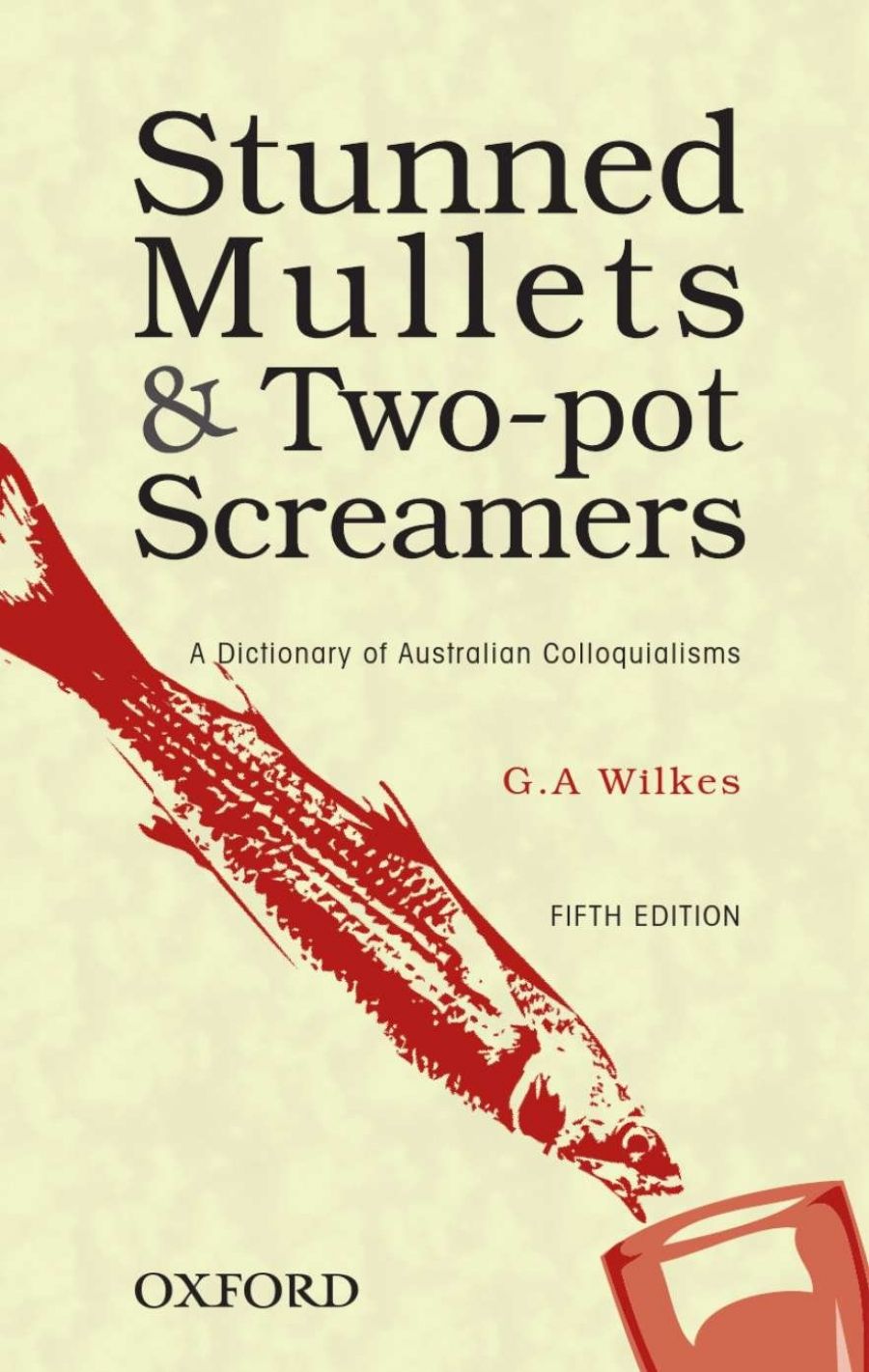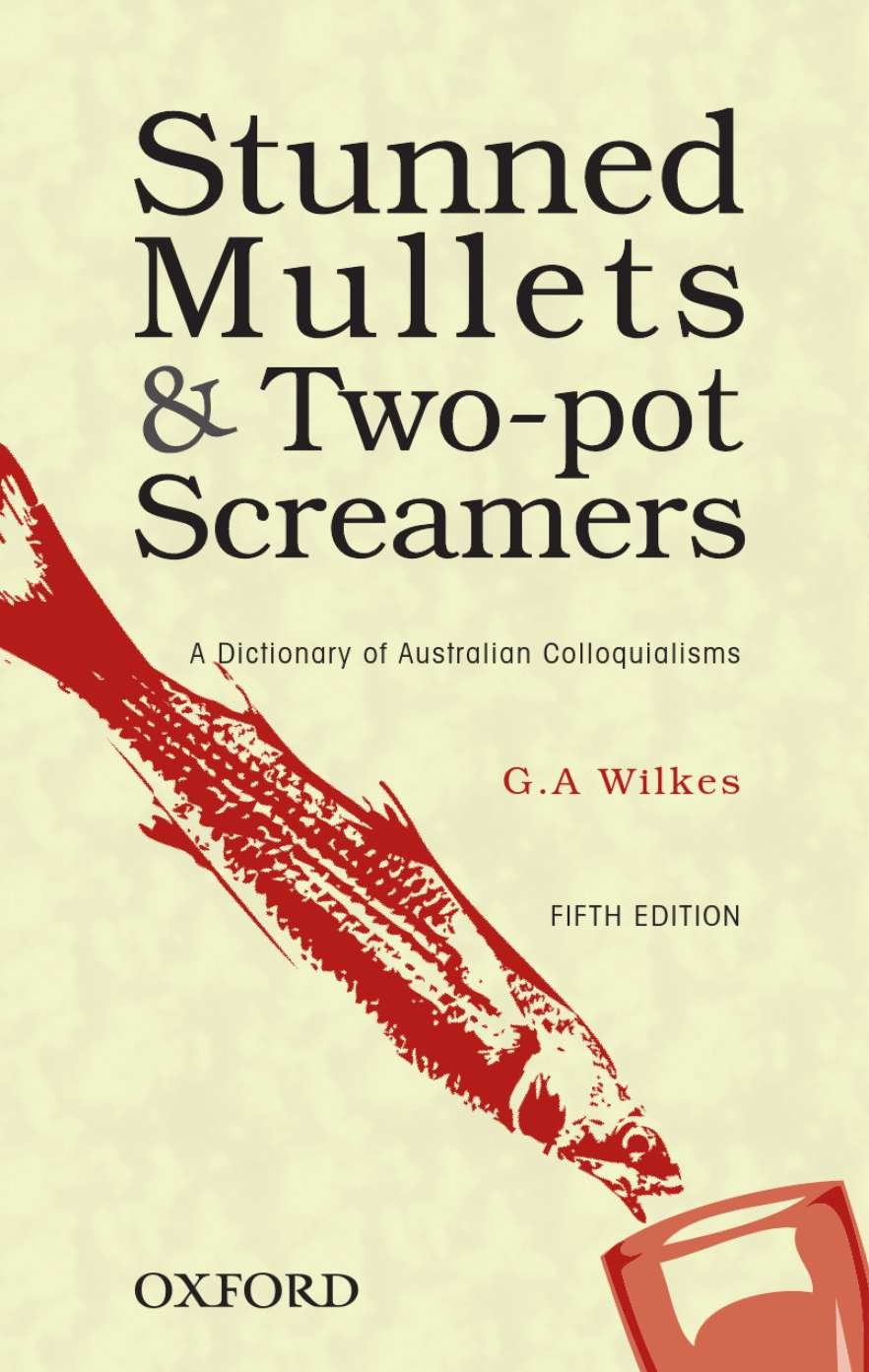
- Free Article: No
- Custom Article Title: A dillybag of goodies
- Review Article: Yes
- Article Title: A dillybag of goodies
- Online Only: No
- Custom Highlight Text:
Gerry Wilkes has done the state a great deal of service, and he should get full credit once again, as the eclipsed terrain of Australian literature emerges into the sunlight: which it seems to be doing right now, to judge from some recent movements in publishing. So let’s keep abreast of our language, all the while: that is to say, of our dominant or mainstream language, amid whatever others we have to offer.
- Book 1 Title: Stunned Mullets and Two-pot Screamers
- Book 1 Subtitle: A dictionary of Australian colloquialisms, Fifth Edition
- Book 1 Biblio: Oxford University Press, $45 pb, 412 pp
- Book 1 Cover Small (400 x 600):

- Book 1 Cover (800 x 1200):

It is fifty years since Wilkes got going, head down and bum up, on his invaluable Dictionary of Australian Colloquialisms, edging aside Sidney J. Baker’s The Australian Language (1945, new edition 1966), which had kept the lifeblood of spoken Oz flowing and – to cruel the metaphor – been the bedside Bible of our comedians: notably Barry Humphries, who has brought so many ripe or rickety tropes back to us. Now Wilkes is with us again, in a fifth edition, his dictionary sporting a lairy new title.
At what indistinct border does a word or phrase retain its cachet of being colloquial? Wilkes perceives the category as being broader than that of slang, and more or less that of ‘Australian English’. This must be why he has included the straightforward noun ‘lamington’, which does not feel particularly colloquial at all. But this is to nit-pick.
What we generally perceive as colloquial, Dr Johnson would have defined as ‘low’: in this way, he described the noun ‘fun’ as ‘a low cant word’. But colloquial language is here presented as quite respectable. Indeed, as Wilkes elegantly says at one point, ‘The established colloquialisms continue to assert themselves’.
Leafing through this indispensable paperback, you could easily feel that you’ve got Christmas and Easter on the one day: it is just so rich with recognitions, comedy, reminders and suggestions. Here you will find ‘Kipper’ for an Englishman, although I had thought this to be an Evan Jones coining; the proverbial ‘pissed-on swag’; ‘esky-lid’ for a boogie-board; ‘in like Flynn’; the ‘Silver Budgie’; ‘yonnie’, ‘molo’ and ‘grey nomads’, and ‘If it was raining pea soup, I’d get hit on the head by a fork’.
Certainly, there are or were family expressions which I was never going to find here; exclamations like ‘celestial wombats!’ and our impatient ‘toddliamo’; the sour fiscal term, ‘sadomonetarist’; ‘wallagapoogy’, the nursery’s unseen monster; and ‘garbistan’, that undefinable quality which distinguishes genuine art. But I was greatly comforted to find here the lovely expression, ‘full up to pussy’s bow’. ‘Dolly’s wax’ was nearby, too, waiting to take a bow.
Also absent is ‘ubbles’, my father’s onomatopoetic expression for going to the lav to do Number Two: mind you, it always sounded rather vulgar: as does ‘ingy’, for the resultant product. Wilkes inserts ‘pie-face’ as a slang term for an Asian, whereas in my boyhood it was a semi-affectionate greeting, much employed by Dad. My friends nowadays are apt to use ‘sending up zeds’ for sleeping, but it doesn’t make the cut, alas.
The names of places surely presented Wilkes with other problems, as he could have gone on with their familiar soubriquets or applications till the cows came home. Thus we have ‘getting off at Redfern’, and its surprising corollary which makes use of Brunswick and Coburg, but not the more familiar ‘getting off at Jolimont’, for localising coitus interruptus. And we lack Sufferers’ Palestine, surely a widespread nickname for Surfers. Any Croweater or Taswegian, envious of the ‘golden triangle’ and its cultural dominance, could surely add more cases; and by this triangle I certainly do not mean Double Bay, with its enviable shoe shops. Being a Sydneysider, Wilkes would not have thought of ‘Ho Chi Minh City’ for Richmond, Victoria, I dare say; nor of ‘Trobbers’ for a leading university in my home state.
I haven’t gone to the scholarly length of checking out any of Wilkes’s entries against the Geordies’ grubby little classic, Roger’s Profanisaurus, but this kind of scholarship can only go so far. Let the Kippers rejoice in Newcastle-on-Tyne if they find us out. Which reminds me that, like many of my compatriots, I like to think of ‘kybosh’ as a typically Aussie word – like ‘plonk’ – but there’s a Tommies’ song from World War I about ‘put[ting] the kybosh on the Kaiser’.
Along the way, I did notice the absence of ‘pavvy’ for a cricket or footy pavilion. Moreover, the absent ‘ferrets’ for batsmen who come in after the rabbits is notable, but it probably originated in the Porridge Isles, like ‘ky-bosh’. Yet ‘Pongo’ is here, a term I’ve only encountered in Anthony Powell’s fiction, where it seems to have a different meaning from Wilkes’s two, if still within the military establishment.
Mind you, any review of a book such as this can rattle on and on about lamentable omissions, without paying credit to the solid, imaginative work that Gerry Wilkes has given us here. There’s no fart-arsing around in these rich, intriguing entries: everybody who is not a toddler or a no-hoper should have a copy of Stunned Mullets and Two-pot Screamers. And it’s so up to date; ‘not happy, Jan’ has already made it. Maybe we can even wait for ‘working families’ in the next edition, along with the rapidly spreading ‘cattle-dog’ for an art catalogue. After all, the book includes ‘kevinism’.
What is important about the gallimaufry of colloquial expressions gathered here is that they all add their liveliness or quaintness or dagginess to the range of expressions which we enjoy. A high proportion of them call for us to keep them alive; I will persist above all with ‘a wigwam for a goose’s bridle’ and with ‘lobster’ for a twenty-dollar note.


Comments powered by CComment